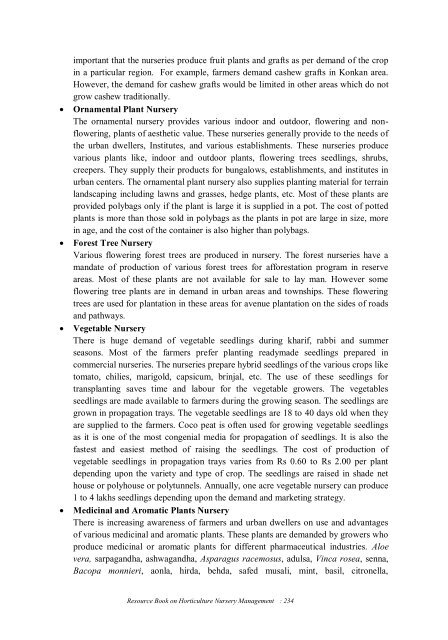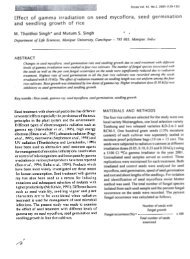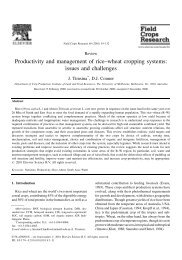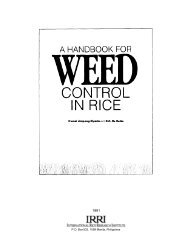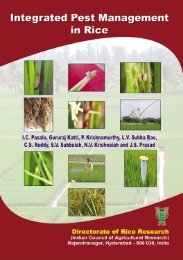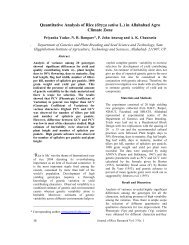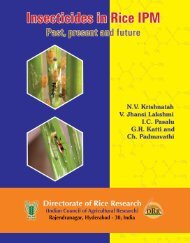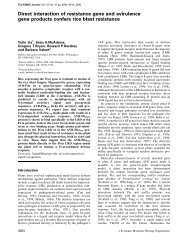Resource Book on Horticulture Nursery Management
Resource Book on Horticulture Nursery Management
Resource Book on Horticulture Nursery Management
You also want an ePaper? Increase the reach of your titles
YUMPU automatically turns print PDFs into web optimized ePapers that Google loves.
important that the nurseries produce fruit plants and grafts as per demand of the crop<br />
in a particular regi<strong>on</strong>. For example, farmers demand cashew grafts in K<strong>on</strong>kan area.<br />
However, the demand for cashew grafts would be limited in other areas which do not<br />
grow cashew traditi<strong>on</strong>ally.<br />
� Ornamental Plant <strong>Nursery</strong><br />
The ornamental nursery provides various indoor and outdoor, flowering and n<strong>on</strong>flowering,<br />
plants of aesthetic value. These nurseries generally provide to the needs of<br />
the urban dwellers, Institutes, and various establishments. These nurseries produce<br />
various plants like, indoor and outdoor plants, flowering trees seedlings, shrubs,<br />
creepers. They supply their products for bungalows, establishments, and institutes in<br />
urban centers. The ornamental plant nursery also supplies planting material for terrain<br />
landscaping including lawns and grasses, hedge plants, etc. Most of these plants are<br />
provided polybags <strong>on</strong>ly if the plant is large it is supplied in a pot. The cost of potted<br />
plants is more than those sold in polybags as the plants in pot are large in size, more<br />
in age, and the cost of the c<strong>on</strong>tainer is also higher than polybags.<br />
� Forest Tree <strong>Nursery</strong><br />
Various flowering forest trees are produced in nursery. The forest nurseries have a<br />
mandate of producti<strong>on</strong> of various forest trees for afforestati<strong>on</strong> program in reserve<br />
areas. Most of these plants are not available for sale to lay man. However some<br />
flowering tree plants are in demand in urban areas and townships. These flowering<br />
trees are used for plantati<strong>on</strong> in these areas for avenue plantati<strong>on</strong> <strong>on</strong> the sides of roads<br />
and pathways.<br />
� Vegetable <strong>Nursery</strong><br />
There is huge demand of vegetable seedlings during kharif, rabbi and summer<br />
seas<strong>on</strong>s. Most of the farmers prefer planting readymade seedlings prepared in<br />
commercial nurseries. The nurseries prepare hybrid seedlings of the various crops like<br />
tomato, chilies, marigold, capsicum, brinjal, etc. The use of these seedlings for<br />
transplanting saves time and labour for the vegetable growers. The vegetables<br />
seedlings are made available to farmers during the growing seas<strong>on</strong>. The seedlings are<br />
grown in propagati<strong>on</strong> trays. The vegetable seedlings are 18 to 40 days old when they<br />
are supplied to the farmers. Coco peat is often used for growing vegetable seedlings<br />
as it is <strong>on</strong>e of the most c<strong>on</strong>genial media for propagati<strong>on</strong> of seedlings. It is also the<br />
fastest and easiest method of raising the seedlings. The cost of producti<strong>on</strong> of<br />
vegetable seedlings in propagati<strong>on</strong> trays varies from Rs 0.60 to Rs 2.00 per plant<br />
depending up<strong>on</strong> the variety and type of crop. The seedlings are raised in shade net<br />
house or polyhouse or polytunnels. Annually, <strong>on</strong>e acre vegetable nursery can produce<br />
1 to 4 lakhs seedlings depending up<strong>on</strong> the demand and marketing strategy.<br />
� Medicinal and Aromatic Plants <strong>Nursery</strong><br />
There is increasing awareness of farmers and urban dwellers <strong>on</strong> use and advantages<br />
of various medicinal and aromatic plants. These plants are demanded by growers who<br />
produce medicinal or aromatic plants for different pharmaceutical industries. Aloe<br />
vera, sarpagandha, ashwagandha, Asparagus racemosus, adulsa, Vinca rosea, senna,<br />
Bacopa m<strong>on</strong>nieri, a<strong>on</strong>la, hirda, behda, safed musali, mint, basil, citr<strong>on</strong>ella,<br />
<str<strong>on</strong>g>Resource</str<strong>on</strong>g> <str<strong>on</strong>g>Book</str<strong>on</strong>g> <strong>on</strong> <strong>Horticulture</strong> <strong>Nursery</strong> <strong>Management</strong> : 234


